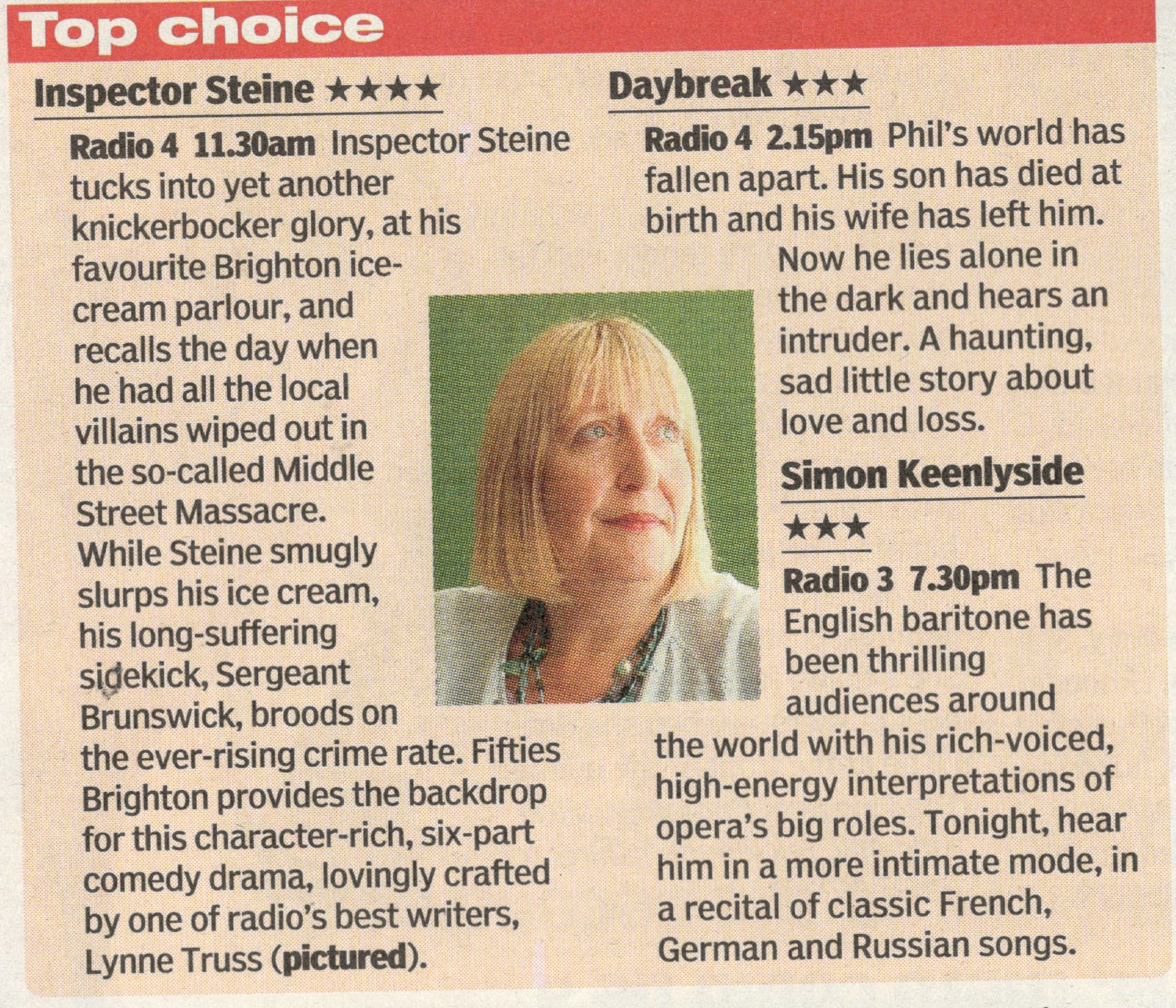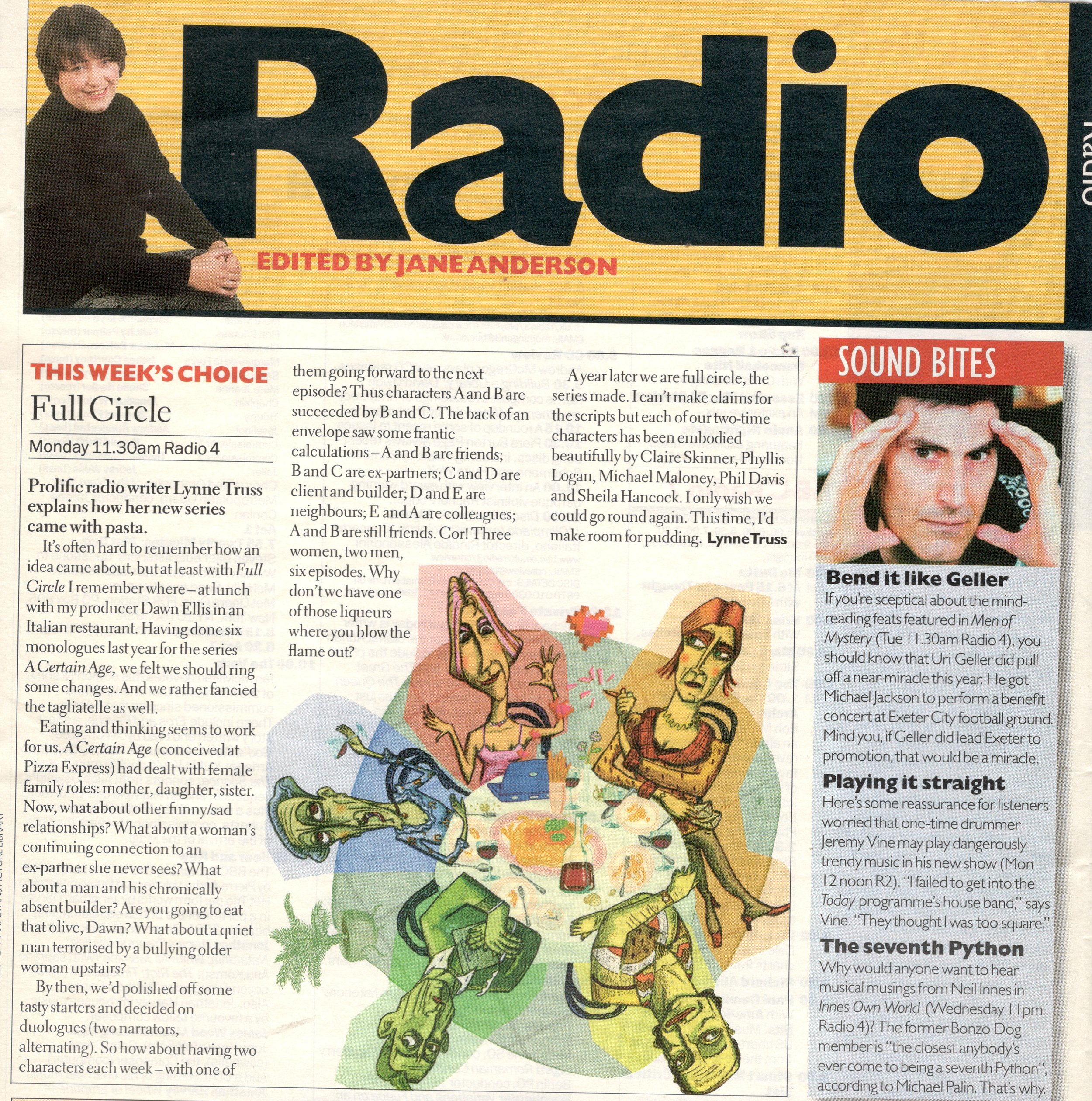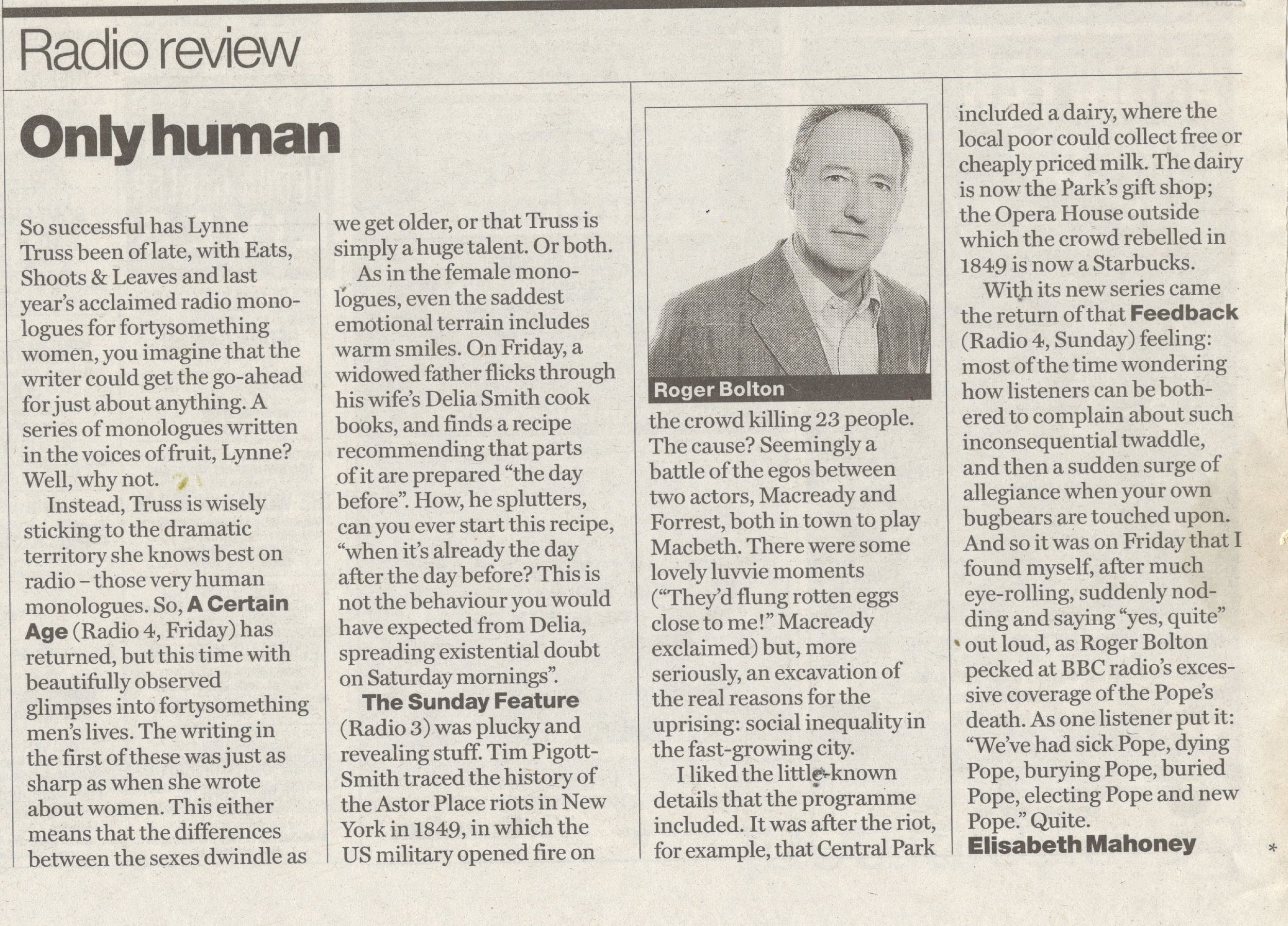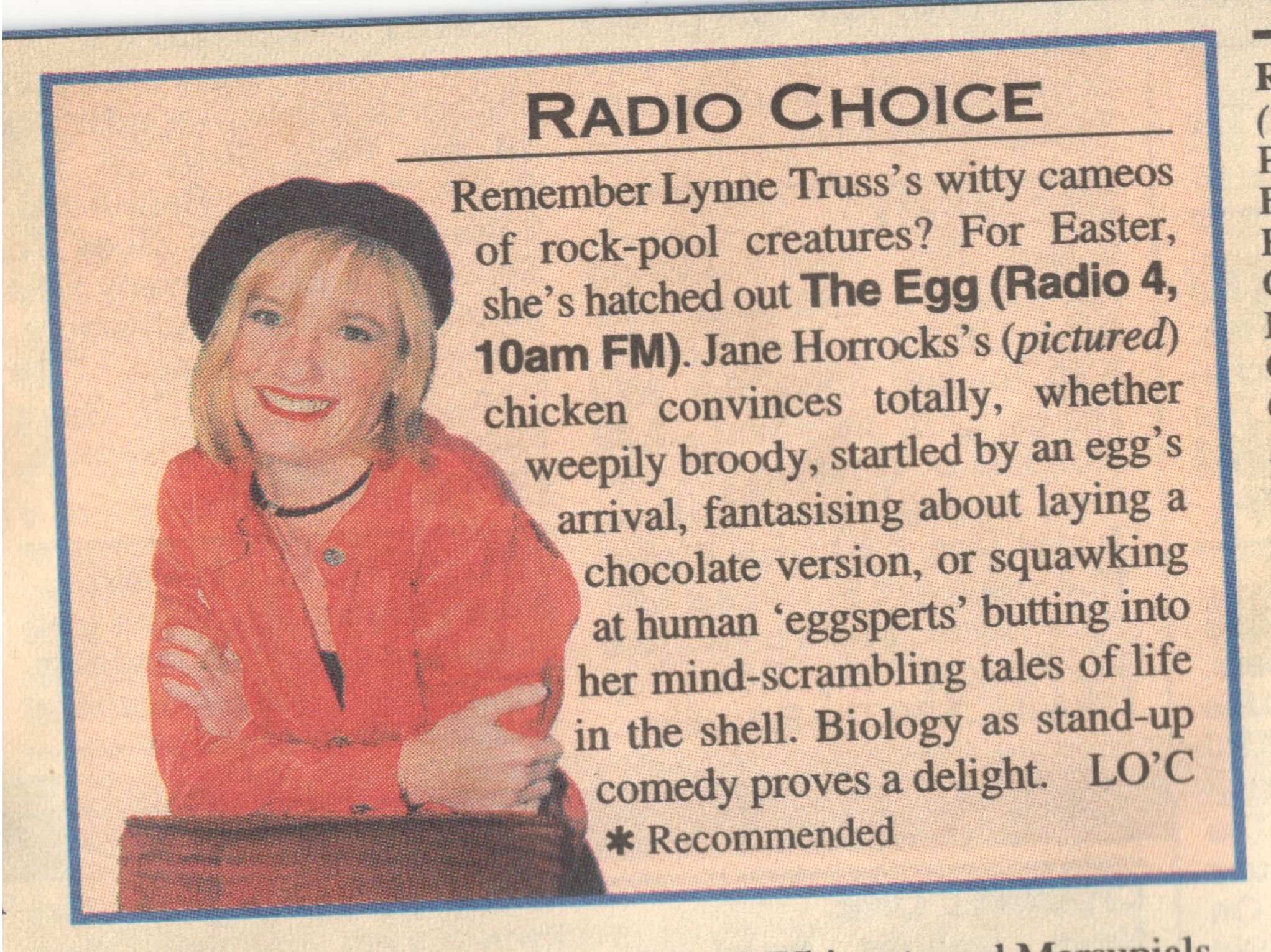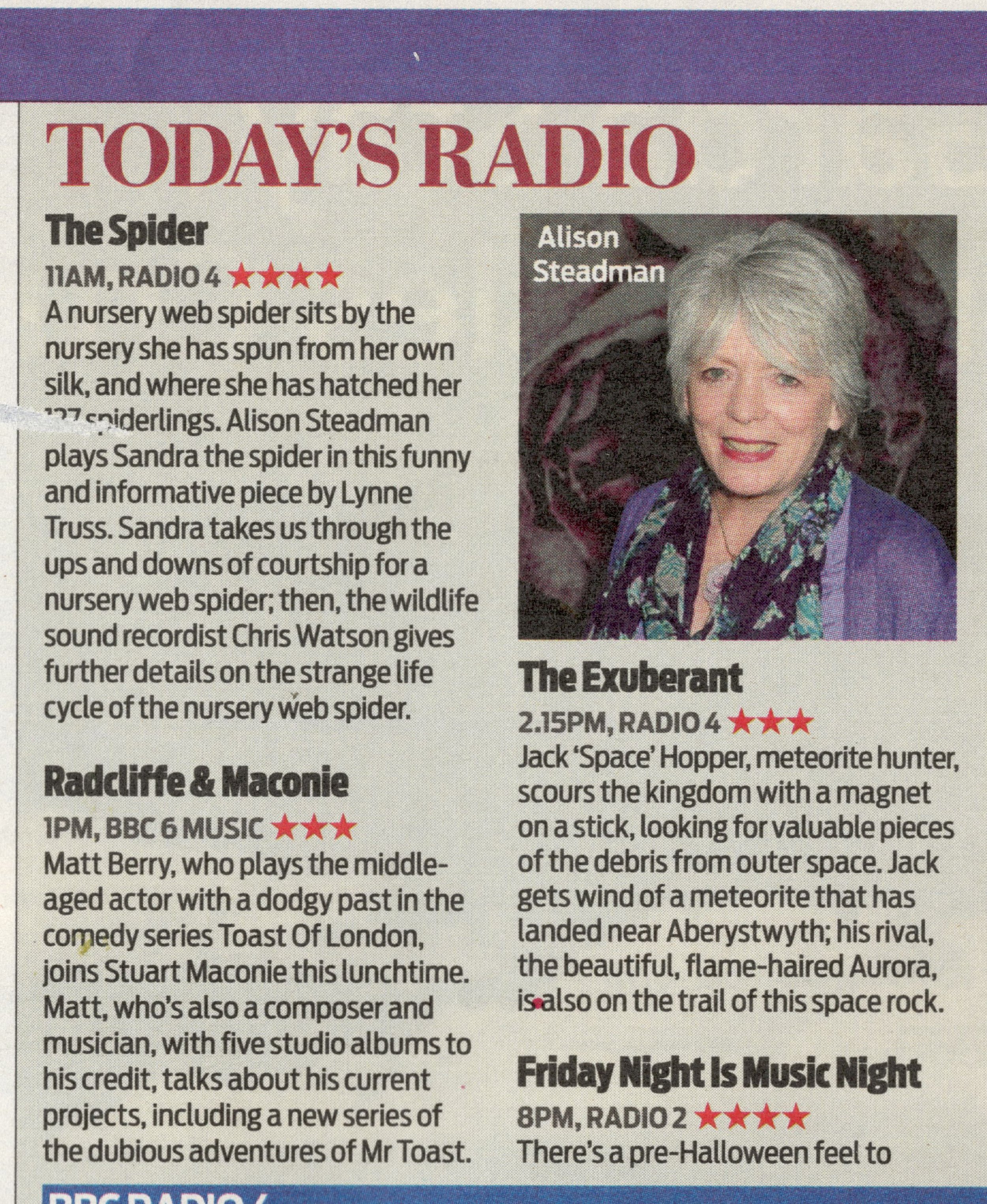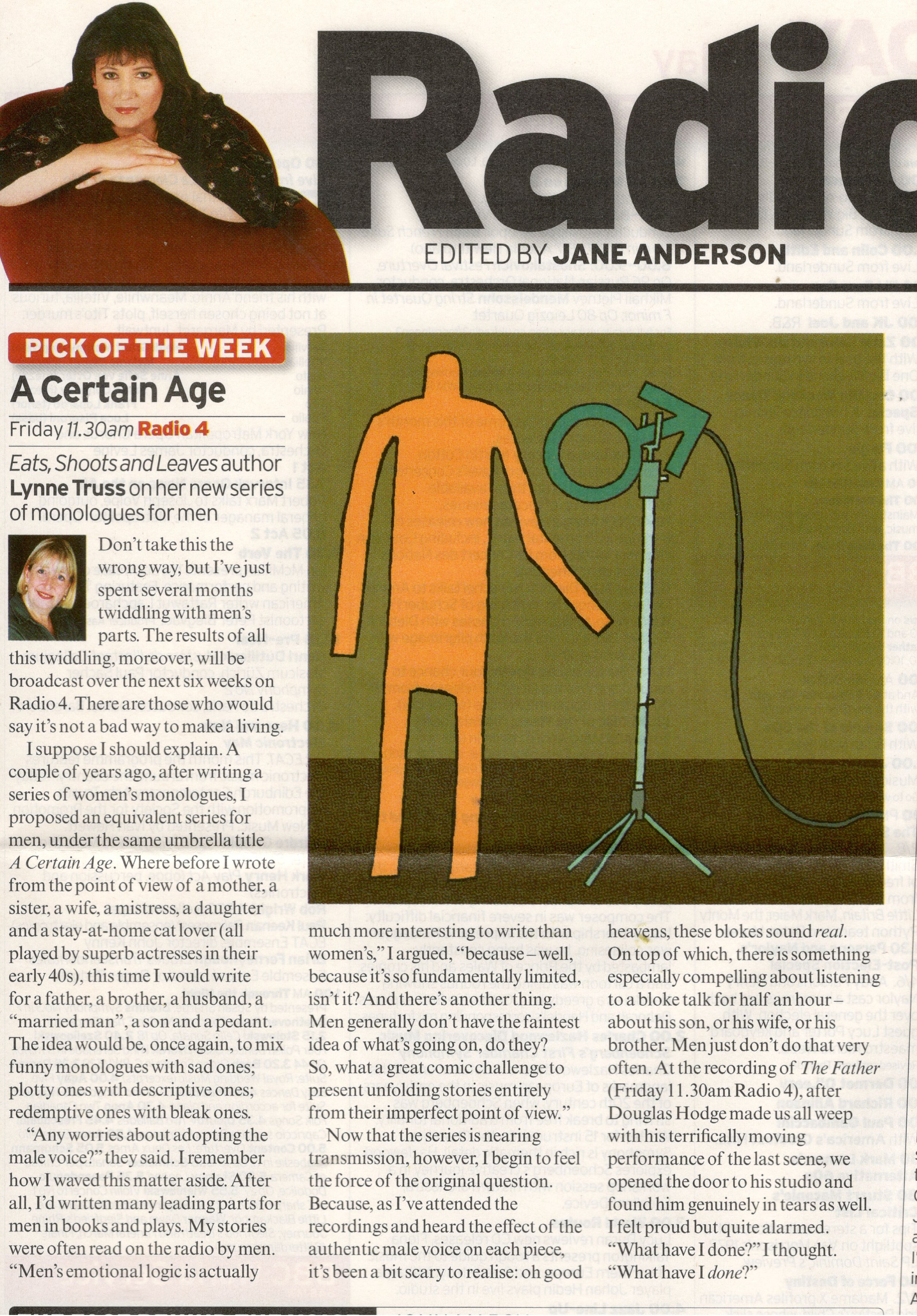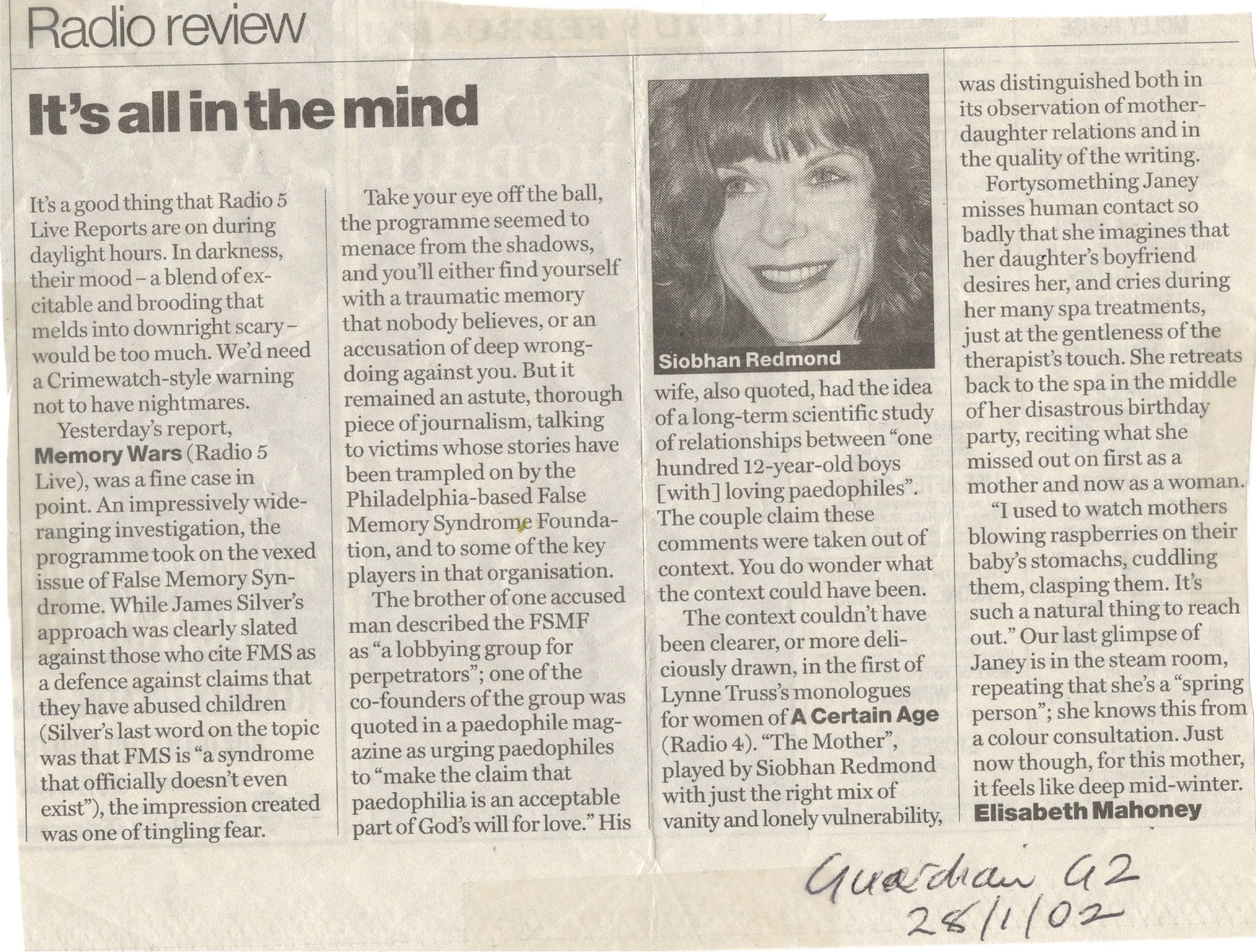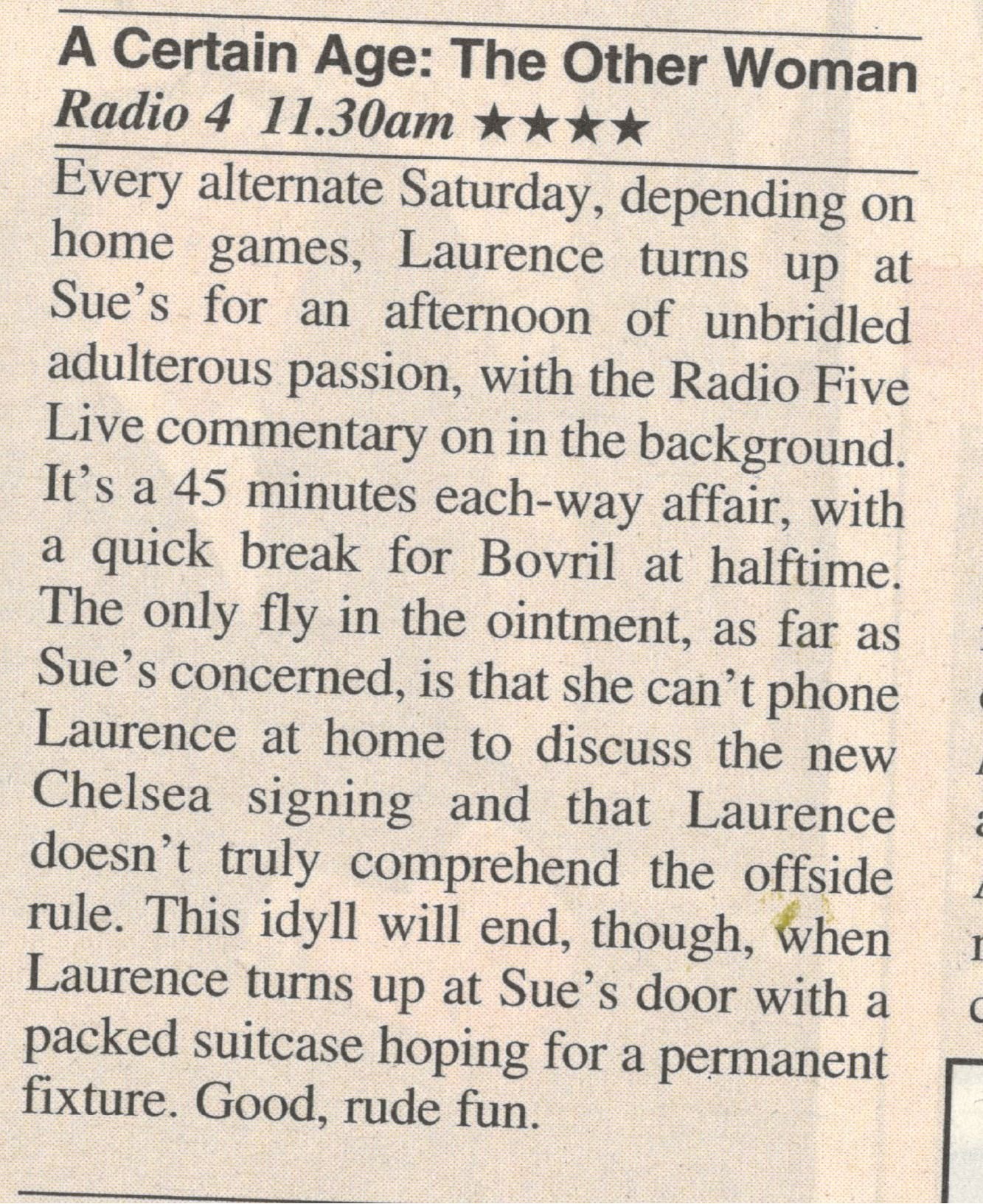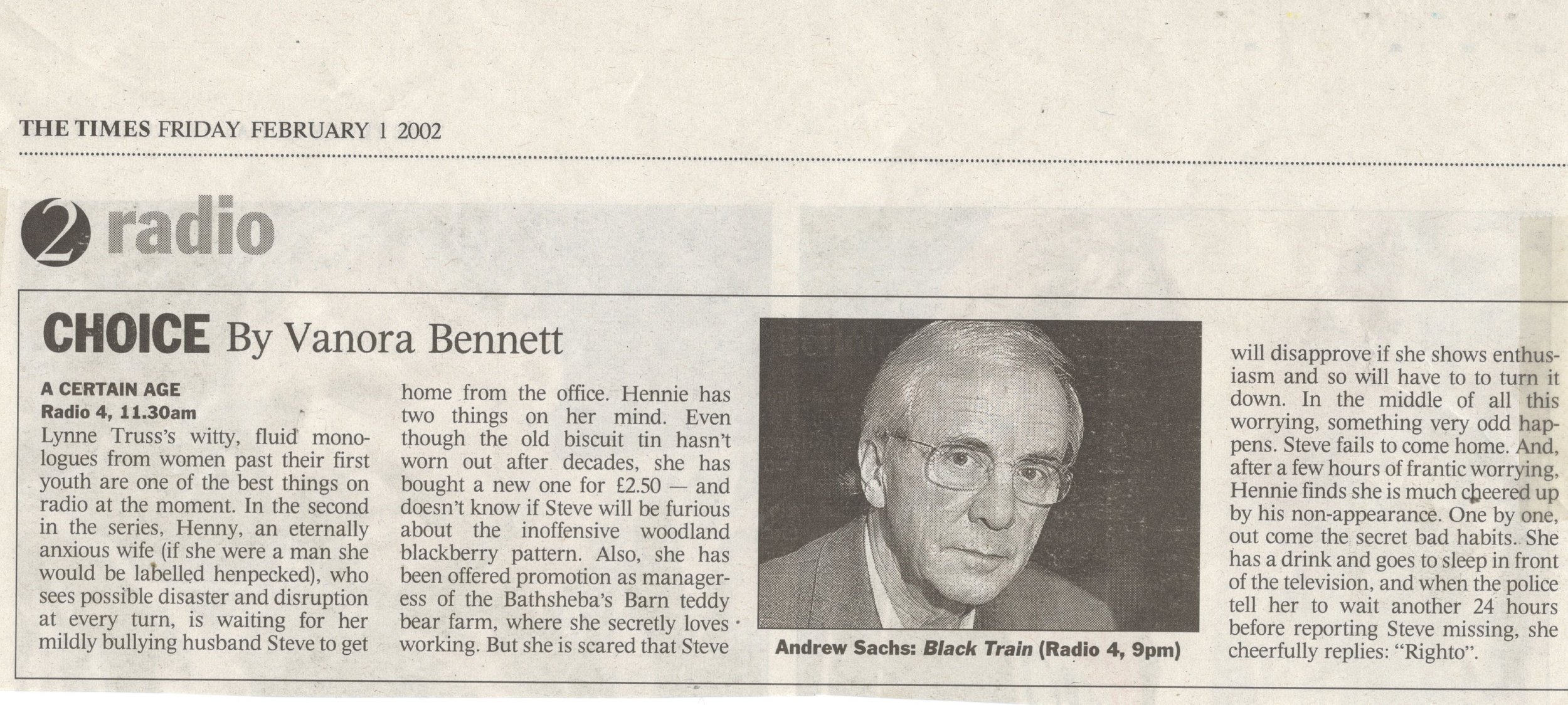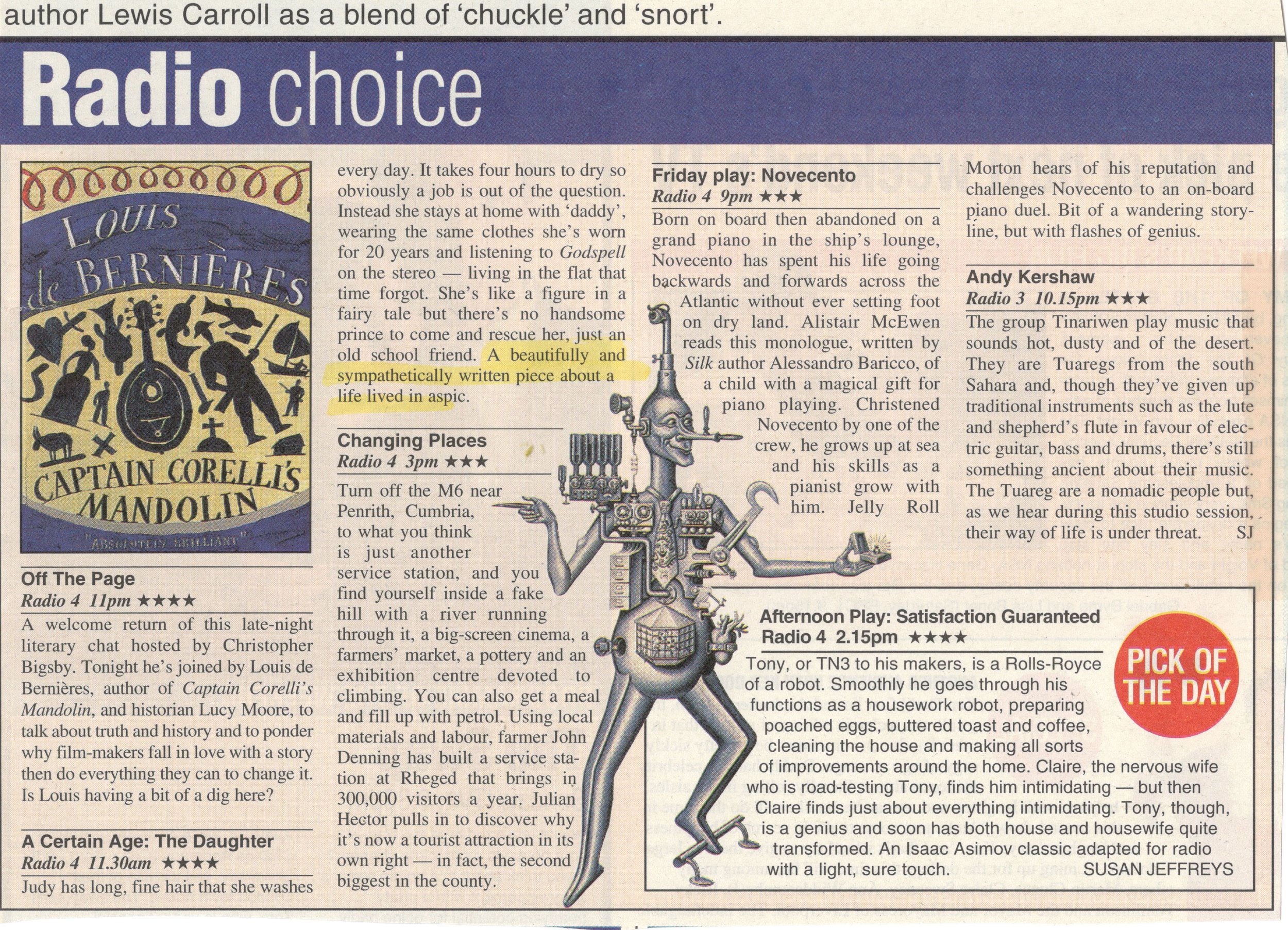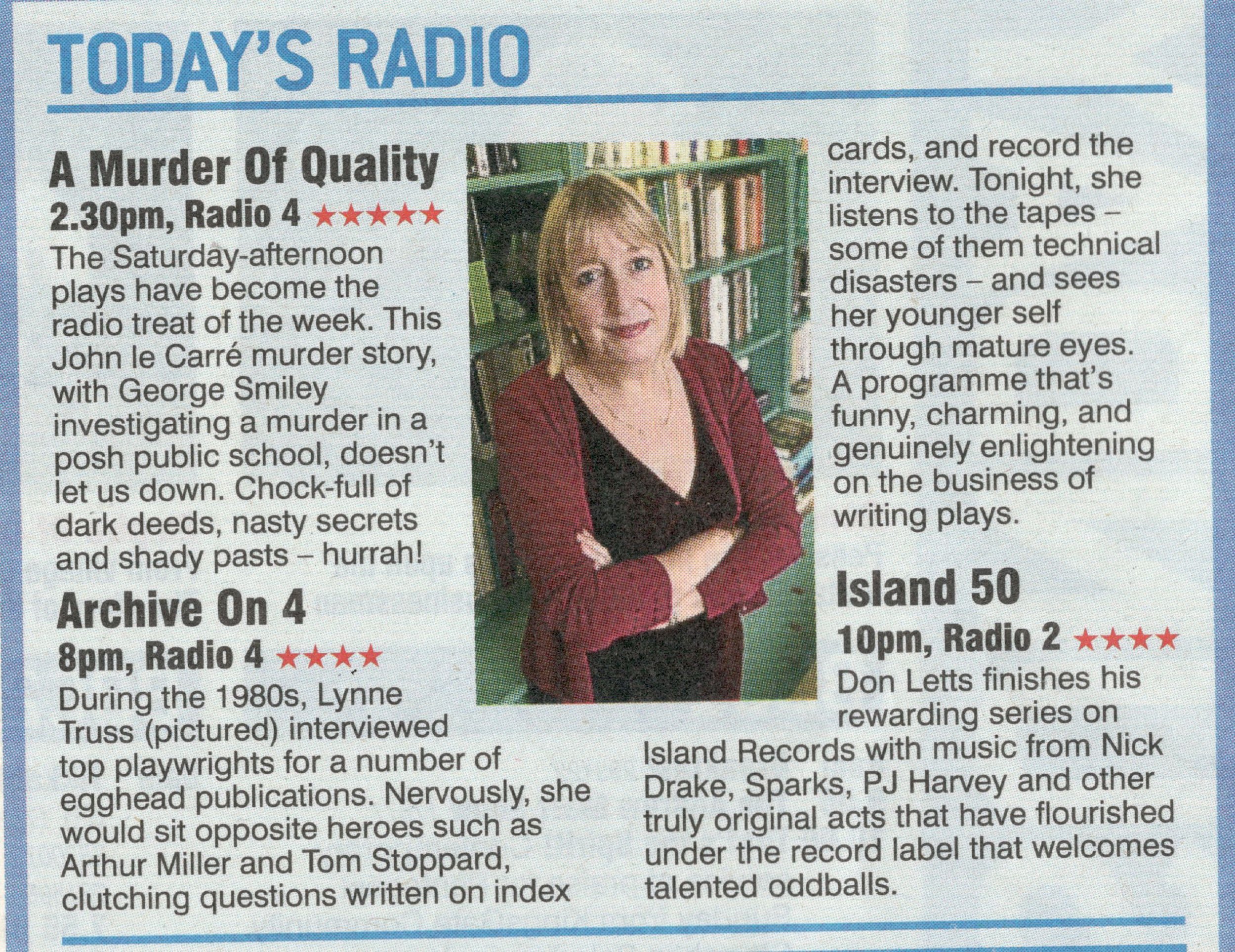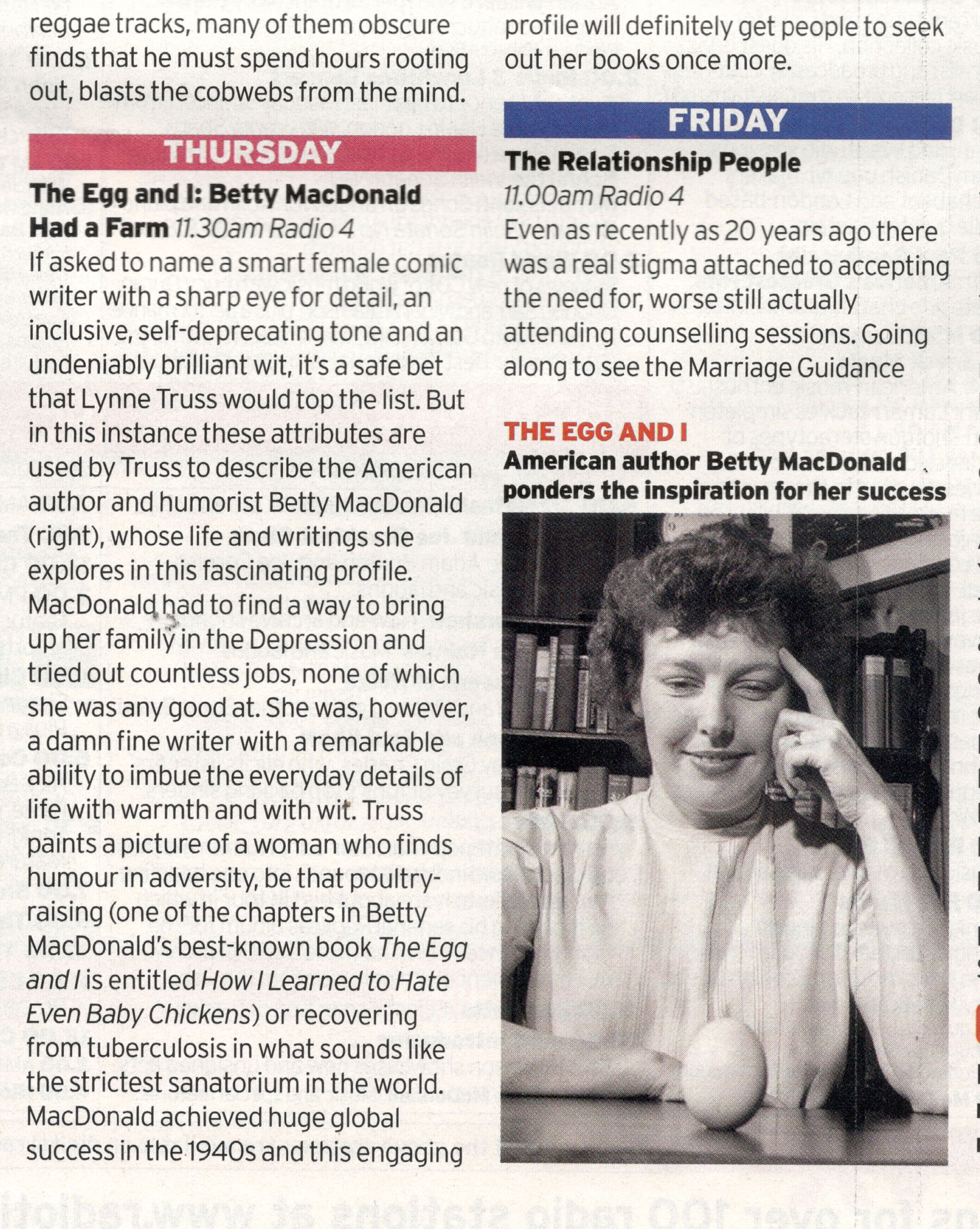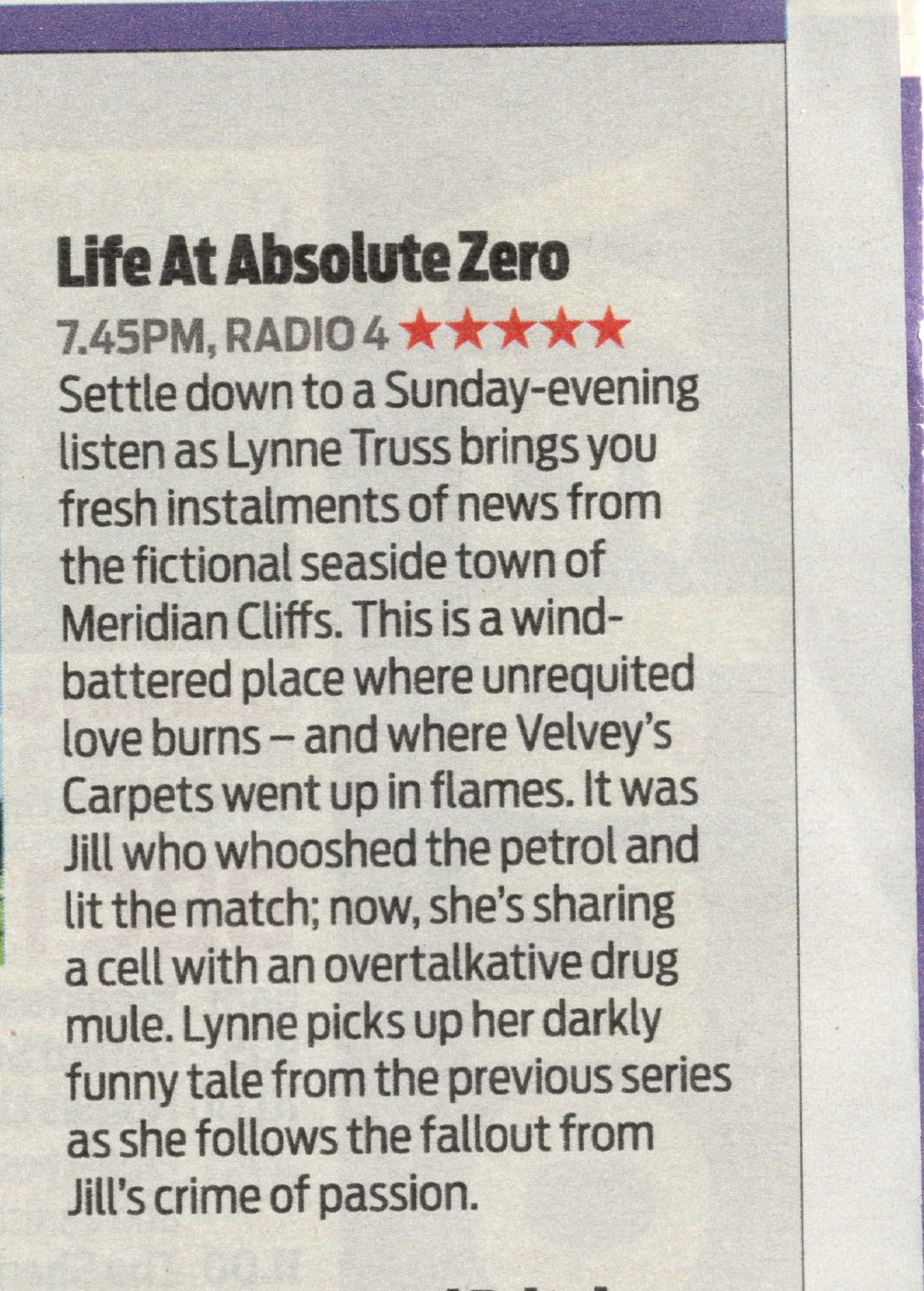Radio
I love writing for radio.
The relationship with the listener is more direct than in any other form, it seems to me: you get to communicate thoughts from one brain directly into another.
In this section are plays, series, dramatic monologues and feature programmes, but I suppose the biggest achievements were my two series of A Certain Age in 2002 and 2005, and the 26 short stories that made up Life at Absolute Zero, which I was able to read myself, directed by the (very) expert producer Kate McAll.
The great joy of the plays was working with actors. I am always a bit awkward around them, because I am in awe. I often write specifically for an actor, just hoping that they will be available when the time comes, and it’s a policy that has worked out more often than you might imagine.
Drama
Plays
-
This half-hour play was written for Peter Kavanagh of the BBC Drama Department.
It concerned a woman writer (Belinda) so absorbed in her work that she allows her cleaning lady to take over all the aspects of her life she’s too busy to deal with. This starts with cleaning and ironing, but ends up with the well-intentioned cuckoo displacing Belinda completely – sleeping with the husband, for example, and appearing in her place on The Late Show.
It was a lot to pack into 30 minutes! I liked the idea that having a double take over your life isn’t necessarily a sinister thing. I felt it could actually work out well for some people. Of course I was overwhelmed by the quality of the cast Peter attracted to my first play. Good heavens.
Producer was Peter Kavanagh
Cast included Nicholas Le Prevost, Geraldine James and Natasha Pyne.
-
I was keen to write a play that observed the unities (as they say). It would last thirty minutes and cover thirty minutes in the lives of a couple named Mick and Hilary, who were played wonderfully by Michael Maloney and Haydn Gwynne. I later wrote another play for this pair, with a similar anxiety-raising scenario.
This one was about having half an hour to spare before leaving for holiday. To Hilary, this isn’t long; to Mick it’s enough time to undo all the preparations already made. Mick was heavily based on an exasperating ex-boyfriend; Hilary was clearly me, although I hope a slightly more uptight version.
Getting all the time-checks to work gave my producer a real headache, I’m sure, but it was worth it to have Hilary saying, “It’s already twenty past two, Mick!” and for listeners to look up at the clock and say, “By golly, so it is.” Looking through my files, I found that the play won an EBU award. Well, hoorah.
Producer Peter Kavanagh
Cast Michael Maloney and Haydn Gwynne
-
My first hour-long play, which seems to have gone down well with listeners, but I remember it mainly as a stressful experience. Before the read-through I was informed (bombshell!) that the script was much too long: maybe a third needed to be knocked out. So I feverishly made big cuts which were laboriously passed on to the actors, but then the read-though ran incredibly short, so all the cuts had to be re-instated. I had recently learned about the sexism of golf clubs, so I was a bit red-hot on how absurd it all was.
Again I was stricken by the fame quotient of all the actors in the room, and awkwardly tongue-tied around them. In my files is a card from Douglas Hodge apologising for not being available. Blimey.
Producer Peter Kavanagh
Cast included Josie Lawrence, Nicholas Farrell, Rachel Atkins, James Grout and John Rowe
-
I rather thought my radio drama days were over after Ladies’ Day, but in 1999 along came producer Brian King, from Bristol, all enthusiasm for me to write another play, and I’m very grateful to him. We had a great time with this one, set in the early 1970s and focusing on a serious and bookish young woman (obviously me) learning about life in the arid environment of an academic library, and batting away the advances of the chief librarian, brilliantly played by John Rowe. Our heroine wrote and sang Joni Mitchell-type songs, which were lovely to do.
By the way, this play included the information that the printers of St Petersburg kicked off the first Russian Revolution when they demanded to be paid for the punctuation – which in the course of time became the dedication of Eats, Shoots & Leaves.
It was recorded not in a studio but in a library in Ruislip. The habit of not-coping-with-the-stature-of-the-cast continued.
Producer Bring King
Cast included Rachel Atkins, Cheryl Campbell, Sam West, Douglas Hodge and John Rowe
-
Having tortured Peter Kavanagh with a real-time drama (Thirty Minutes to Kill), I now did the same to Brian King, with Place of the Invalids.
This time it was a 45-minute play, but the cast and characters were the same, i.e. Mick and Hilary played by Michael Maloney and Haydn Gwynne. We recorded it in a house, rather than a studio, and it was an absolute hoot.
This time the premise was that Hilary was ill in bed, and trying to listen to the Afternoon Play in real time, but Mick was compelled to compete with her to be more ill, while also insisting on fixing the washing machine (because he fancied it, not because he knew how).
These Mick and Hilary plays would nowadays be seen as obvious demonstrations of coercive control, but of course no one knew the term back then. I personally found Mick’s ingeniously manipulative antics in Place of the Invalids quite hilarious, but many people found it much too familiar and/or upsetting. One reader wrote to me after listening: “Now I am absolutely wiped out with the effort of trying not to scream and throw things at the radio.”
Producer Brian King
Cast Michael Maloney and Haydn Gwynne
-
My absolute favourite of my radio plays.
Producer Karen Rose had pitched an idea to Radio 4 about call-centre workers, and it had been accepted. Our idea was to take three different protagonists and cut between their various calls in the course of one day. One was a software customer service person in Scotland; one in India, trying to flog a new service called “Caller Rebuff”; and one working for a building society in Wales, who on his last day decides to torture customers by asking for non-existent passwords, giving them outlandish prompts such as “A river in South America”, “a fictional building”, or “a type of bun”.
The theme, of course, was alienation, and the idea was that each of the three would make one significant connection with another person in the course of the day. Karen cut it together perfectly. “Sorry, Mrs Jenkins, but the correct answer was the Nile.” “But the Nile isn’t in South America!” “Yes, but the real Mrs Jenkins didn’t know that.”
Producer Karen Rose
Cast Katy Murphy, Kulvinder Ghir and Jason Hughes
-
In the early 2000s I had enjoyed watercolour painting holidays in Greece, so it was a short reach to set a play on one. The challenge was to keep the cast small (painting groups are quite large) and to make the play about something else entirely. Derek Jacobi agreed to be in it at an early stage and I hope it was good enough.
He played Alec, the benign, modest teacher of amateur artists, who is pursued on this holiday by a biographer trying to unearth the truth of his childhood, when he appeared as a child actor in a shamefully bad Lord of the Flies type film called Bora Bora. His brother (briefly heard from and played by Corin Redgrave) had gone on to become a huge star. Charlie suspects Alec was hard done by. Alec doesn’t want to know. In both art practice and life, he is a fan of negative space. The truth eventually comes out.
Producer Ned Chaillet
Cast included Derek Jacobi, Corin Redgrave, Cheryl Campbell, Adrian Bower
-
Produced in Cardiff by Kate McAll, this was a quite serious 60-minute piece about a fireman haunted by the death of a colleague. Kate and I visited a fire station in West London to get a sense of the place, and our lead actor Adrian Bower actually went out on a “shout”, which was exciting.
We did ask the firemen to read the script, and I was chuffed when one of them pointed to a page and snorted, “I know who this is!” – about a character I had made up. Interestingly, Kate was later asked by the fire service if they could play it as part of their counselling, which was extraordinary. A real-world application of drama was a new thing for me.
Producer Kate McAll
Cats included Adrian Bower, Struan Rodger, Jeff Rawle and Joe Absolom
-
This seasonal play rounded off Inspector Steine, and was in part a riff on the famous O. Henry story The Gift of the Magi, in which a young wife (with no money) sells her hair to buy a lovely chain for her husband’s watch, and the husband pawns his watch to buy combs for her lovely hair. Mrs Groynes narrated, which was new.
At the centre of the play was her relationship with Captain Hoagland. They are both (unnecessarily) unhappy; Mrs G because Hoagland is a hero while she’s a low-down criminal; Hoagland because he’s a limping has-been, while she’s a successful and beautiful woman. Meanwhile Twitten innocently asks Brunswick if anything horrible ever happened to him at Christmas, because he never learns. Steine is Father Christmas at Hannington’s. There is a jewel robbery, some kind deceit, and a small fire, but all ends happily.
Producer Karen Rose
Cast Michael Fenton Stevens, Samantha Spiro, John Ramm, Matt Green and Robert Bathurst
Series
-
Why I thought I was the right person to write a broad Up Pompeii type comedy in Ancient Greece I don’t know, but I’m pretty sure producer Brian King liked the idea and got the commission for the first series. This was to be recorded in front of an audience – ideally an audience laughing at the jokes. All I can say is, I did my best.
There were twelve episodes in all – all set in 408BC in a fish restaurant during the Spartan siege, and featuring Aristophanes (successful playwright of crowd-pleasing comedies), a youthful Plato, the aged Socrates, the gloomy Heroclitus (transposed from a previous period) and Socrates’s unhappy wife Xanthippe. Also present was an annoying Oracle, who saw signs from the future, such as “Oldham, Home of the Tubular Bandage” and “Have You Paid and Displayed?”
At the first recording, in Pebble Mill in Birmingham, I sat behind two young women who looked so bored and confused they were on the verge of tears. “Oops,” I thought. After that, we hired a warm-up man, but I think he unfortunately raised audience expectations too high.
But I did enjoy the writing and astonishingly we got a second series. The cast were all spiffingly good and I was grateful. I once met a man in Wimbledon Library who had loved Acropolis Now and could actually quote it, so it did have a target audience somewhere.
Producer Brian King
Cast Robert Hardy, Rosemary Leach, Stephen Moore, Alan Cox, Tom George and Gavin Muir. In the first series Xanthippe was played by Rachel Atkins; in the second it was Imelda Staunton.
-
My passion for real-time radio found a new outlet here, but an even more complicated one.
This time, over four episodes, a sweet but harassed young woman named Susan tried to keep clear a simple half hour for watching a costume drama featuring Mrs Milliner (1920s society hat maker), but interruptions kept her away from it. To make matters worse for Susan, the heroine of the TV drama was tough and single-minded, and never allowed herself to be distracted by time-wasters. So alongside the real time of Susan’s half hour, there was the real half hour of Mrs Milliner.
I have to say that writing pastiche House of Elliot stuff was the greatest fun I’ve ever had as a writer. I revived Mrs Milliner later for the Edinburgh stage piece Hell’s Bells.
Producer Dawn Ellis
Regular cast included Caroline Harker, Jane Asher, Jonathan Coy and Beth Chalmers. Guest appearances from Jonathan Firth, Brigit Forsyth, Matilda Ziegler and Jason Hughes
-
This was a five-part comedy for the 15-minute Woman’s Hour slot, which was a new format for me. Over the week we told a very surreal (not to say completely insane) story of a rule-obsessed Welsh golf club as a sort of Cold Comfort Farm. The gloomy, cursed club’s name in Welsh meant “the golf club at the end of the land, beside a stream, under a rock, where people hit balls about and it rains.” Thanks to the curse of Uncle Gwyn, every member, one by one, had died as a consequence of breaking some minor club rule, such as wearing spiked shoes in the car park while being lifted into an ambulance. It had rained for twenty years. Meanwhile “Aunty Susan” was a man; a disgusting old greenkeeper attracted our narrator Angharad (played by the wonderful elderly Margaret John), and the young club secretary was played by Tom Allen, who (shall we say) brought an unusual amount of energy to the part. It was made in Cardiff.
Producer Kate McAll
Cast included Margaret John, Tom Allen, Lynne Seymour, Howell Evans and Brian Hibbard
-
Writing Inspector Steine became my main job for a few years here. Later, of course, it became my main job again when I wrote the Twitten novels. The set-up was just very addictive: 1950s Brighton; four regular main characters; loads of seaside stuff to hang plots on. The four main characters were Inspector Steine, self-satisfied and pompous; Sergeant Brunswick, avid to catch criminals but over-confident of his under-cover abilities (often shot in the leg); Constable Twitten, young, new and keen, and convinced there is a criminal mastermind at work in the town; and finally Mrs Groynes, the seemingly simple cockney charlady who IS the criminal mastermind in the town.
It was always a studio comedy, and it was expensive to make, so it couldn’t go on for ever. But we had a wonderful time making it, and the voices of the actors were always in my mind while I wrote the novels too.
Audible, I’ve just noticed, offers all the four series together for the price of one credit, with a very nice piece of artwork.
Producers Karen Rose and Marilyn Imrie
Regular cast: Michael Fenton Stevens, John Ramm, Matt Green and Samantha Spiro. In the first series Mrs Groynes was played by Jan Ravens.
Guests included Janet Ellis, Philip Jackson, Will Keen, Douglas Hodge, Nicholas Le Prevost, Rachel Atkins, Allan Corduner, Jason Hughes, Robert Bathurst, Mark Heap, Adrian Bower, Ewan Bailey, Kim Wall
Scrap Book - Drama
Adaptations
-
This started life as a short story by Roy Kerridge, set in the 1960s Brighton criminal underworld. I think Julie Burchill mentioned the story to my producer Karen Rose, who then asked me if I’d like to adapt it.
It was my first experience of working with Samantha Spiro, and also with Will Keen – both were hilariously funny and obviously destined for greater things, but not before doing a bit more radio with me, thank goodness. The great coup was getting Richard Griffiths to play Maurice. I’d loved his voice since his early RSC days. Stand-out moments in the studio were Will Keen gamely acting the craven Dave on all fours (the script demanded it), and the studio manager, David, reproducing the sound effect of a gas meter being wrenched off a wall … by actually wrenching a gas meter off a wall. (He’d prepared one earlier.)
Producer Karen Rose
Cast Richard Griffiths, Samantha Spiro, Will Keen, Cliff Parisi, Stephen Frost and David Holt
-
This was a passion project for me. The central character Margaret is a plain young woman, in 1943, meeting and worshipping the outrageously vain and pompous playwright Gerard Challis, whose posh bohemian Highgate family enchant her and then shamelessly exploit her. Meanwhile the ghastly Challis (of course) falls in love with Margaret’s more attractive friend.
The book’s very radical message is that not everyone is destined for romantic love. Sounds depressing, but it isn’t. It was made in Bristol at a magnificent studio in Clifton, just before I flew off to New York for the US publication of Eats, Shoots & Leaves, so it’s very vivid in my memory.
Producer Kate McAll
Cast included Rosemary Leach, Juliet Aubrey, Michael Fenton Stevens, Saffron Burrows, Caroline Harker, Mia Soteriou and Jacqueline Tong
Scrap Book - Adaptations
Monologues
Human
-
Lost in the mists of time, the Struggling Writer was a weekly strand on a Radio 4 books programme. I think because the programme was produced by the drama department, the producers felt it should have a dramatic element along with the reviews and interviews, so I wrote the first-person travails of a jaded unpublished writer, a member of the East Grinstead Creative Writing Collective.
I remember these pieces as about two minutes long, but each of the surviving scripts looks like half an hour’s worth, so I must be misremembering.
Producers Lisa Osborne and Ned Chaillet
Reader Gavin Muir
-
This was an ambitious set of five monologues, in which (theoretically) a mysterious event is described by, in turn, each of a woman’s senses, starting with Smell, and proceeding through Touch, Taste, Hearing, and Vision. It was a clever idea, but I wasn’t clever enough to admit that it didn’t work. Miriam Margolies tried to paper over the cracks with a virtuoso performance, which was kind.
Producer Ned Chaillet
Reader Miriam Margolies
-
Constructed on the same video-diary model as Alan Bennett’s Talking Heads, these half-hour monologues were written as a themed series. I had been struck by the idea that at around 40 years old, it was possible to define oneself by just one relationship. You might see yourself as a mother, a sister, and wife, and so on. In my work to this point I had often dealt with large groups of characters, so this was a personal challenge to myself: to concentrate on just one person at a time, in relation to just one other person. Some were funny, some serious, some shocking. As often before, I wrote with particular actors in mind, and was extremely pleased with the cast my producer brought together.
Producer Dawn Ellis
The cast was: Siobhan Redmond, Lesley Manville, Rebecca Front, Janine Duvitski, Lindsay Coulson and Dawn French
-
Six double-monologues, organised La Ronde-style (ie each character appearing in two instalments). Each episode concentrated on a different relationship, thus: Friend with Friend; Friend with Ex-Partner; Ex-Partner with Builder; Builder with Neighbour; Neighbour with Colleague (who happens to be Friend); Friend with Friend again.
My favourite, I have to say, was the episode of the builder, who is truly convinced that his clients want to hear lies rather than the truth, and who has invented a colleague who never, ever turns up. Michael Maloney gradually losing his rag was gorgeously funny.
Producer Dawn Ellis
Cast: Phyllis Logan, Claire Skinner, Michael Maloney, Phil Davis and Sheila Hancock
-
This second series of A Certain Age turned the focus onto men: a husband, a father, a son, and so on. Again, a wonderful cast was brought together and the series seemed to be a hit. The scripts for both series were published by Profile and then 4th Estate; meanwhile the recordings are available too. I have done a couple of appearances at literary festivals reading The Wife, with either Douglas Hodge as The Father, or James Fleet reading The Brother. Robert Bathurst also read The Brother. And now I think of it, there was once a surreal occasion in Dorset when Marion Bailey read The Sister and Mike Leigh read The Pedant.
Producer Dawn Ellis
Cast: Simon Russell-Beale, Douglas Hodge, Peter Capaldi, Robert Glenister, Stephen Tompkinson and Stuart Mulligan
Natural History
-
Sarah Blunt in the Natural History Unit in Bristol asked me to contribute two monologues to a series she was making for Radio 4. The format was a 10-minute (I think) letter to The Times from various under-valued animals, and she asked me to supply the Urban Fox and the Grey Squirrel. Thus began a very fruitful collaboration.
A quick glance at the first script shows I have the fox eating disgusting rubbish while talking, which became a bit of a trope. “Do you think that old teabag is going begging? I don’t mind if I do, very kind.” I imagined him as a down-at-heel aristocrat, a la Leslie Phillips. Meanwhile the squirrel (female) was incredibly nervous. Both came out well, and Sarah started to hatch more schemes.
Producer Sarah Blunt
Performers Tony Robinson and June Whitfield
-
This was a six-part series, giving fictional life to a periwinkle, a hermit crab, an anemone, a goby fish, a limpet and a lugworm.
Sarah Blunt sent me (as always) a ton of research material and it was my job to come up with the stories and personalities, and to vary the tone as much as possible. Thus, the periwinkle was a seaside entertainer type, with terrible jokes (“Here’s that sick squid I owe you”); the hermit crab was in constant terror of its life and a virtual shut-in; the anemone was a Sloane with Princess Diana overtones; the goby fish was American, and always bigging himself up; the limpet was melancholy, poetic and fin-de-siecle; the lugworm, which spends its whole life eating and excreting sand, was like something out of Samuel Beckett.
In 2012, the series was re-recorded in front of a festival audience in Bristol, with a couple of changes to the cast. A notable thing about Sarah is that she is fearless in pursuing great actors for these natural history programmes, as will become clear…
Producer Sarah Blunt
Performers (1996): Bill Wallis, Geoffrey Palmer, Alison Steadman, Greg Proops, Judi Dench and Tony Robinson
Readers (2012): Bill Wallis, Geoffrey Palmer, Alison Steadman, Sean Power, Samantha Bond and Tony Robinson
-
A half-hour feature on eggs, narrated by a chicken (of course) was Sarah’s next idea for me. Cue a lot of reflex chicken-squawking, every time a word like lucky, lark, book, talk, pluck, berk or muck came up.
I think Sarah knew she wanted Jane Horrocks for the part from the start, and I honestly can’t remember if I was there for the recording. I’d have said not, but on the other hand I remember Jane Horrocks had a problem with one of the main jokes of the script, which was that the chicken remembers the order of egg formation – “albumen, water, membrane and shell” – by singing the words to the tune of the Skye Boat Song (“Sail bonny boat like a bird on the wing”). Evidently not everyone knows the tune to the Skye Boat Song!
Producer Sarah Blunt
Performer Jane Horrocks
-
Another half-hour feature for the Natural History Unit, this time exploring the history of taxonomy, explaining the more glorious names such as the Blair’s Wainscot Moth.
The narrator here is Hopkins, an aged taxonomist clearing his office on his last day and reminiscing about the job (and in particular regretting no longer seeing an old colleague) and explaining that his job was not the Linnaean binomial stuff; he was the demotic man. “I come up with the names people actually remember, like grenadier fish and barnacle goose.” The people upstairs with their fancy Latin are examples of Homo obstructus; homo pedanticus. And yet they still get things wrong!
His last job is to name a tick, and he’s dragging it out, but in the end he is told to name it the Hopkins Tick in recognition of his services. And with that, his job is over. Geoffrey Palmer told me I had written an “actor-proof” script with this, which I hope was a compliment. I thought about it a lot afterwards.
Producer Sarah Blunt
Performer Geoffrey Palmer
-
This was a complete blast. The format this time was three half-hour programmes, with me presenting the monologues in pairs in front of an audience in the theatre at New Broadcasting House.
Again a fabulous cast was assembled, and there was so much interesting stuff to base the comedy on that I was spoiled for choice. A tadpole named Fabio who doesn’t want to grow up; a dragonfly driven by lust; a jolly water boatman resisting the stridulation of another water boatman named Reg; a diving beetle with dark motivations; a sweetly nervous garden spider; and a great pond snail proud of its ability to lay down slime.
It was a marvellous day, and the audience responded brilliantly to our performers, who all pulled out the stops.
Producer Sarah Blunt
Performers Julian Rhind-Tutt, Alison Steadman, Sandi Toksvig, David Ryall, Amanda Root and James Fleet
-
Alison Steadman asked Sarah if we could do this one. The spider in question (Sandra) was a nursery-web spider who couldn’t stop spinning. A really helpful piece of information was that male nursery web spiders would come a-wooing with “nuptial gifts” wrapped in silk, their idea being to distract the female long enough to have their way with her. “And then I realise that he hasn’t let go of the parcel and that he’s trying to nip underneath me to mate with me, so I say ‘Dave! What the dickens do you think you’re doing?’ and I lash out instinctively and kill him.”
The other narrative gift was the spider’s regular (but traumatic) moulting of exoskeletons. In this case, Sandra has kept one of her old ones and now talks to it like a friend.
Producer Sarah Blunt
Performer Alison Steadman
-
It’s not an excuse, just a fact. I wrote these just after my mum died in the summer of 2015, and it wasn’t easy to focus on them. The edible dormouse is nevertheless one of my favourite scripts ever, so I don’t regret the series – and again the cast were terrific.
The six characters were: a Scottish death-watch beetle, a queen wasp, a housefly (joyfully defecating every few seconds), a soprano pipistrelle bat, a Russian edible dormouse, and a dying peacock butterfly.
Again the format was three half-hour programmes, with me introducing them in pairs in front of the BH audience. I think all the natural history monologues are available on Audible.
Producer Sarah Blunt
Performers Bill Paterson, Alison Steadman, Lee Mack, Pam Ferris, Hugh Dennis and Amanda Abbington
Scrap Book - Monologues
Features
-
One of my very first forays into radio, this was commissioned by Kate McAll in Bristol, who became a friend. As the producer of the regular Dear Diary feature, she had the idea of an instalment devoted to comic fictional diaries such as Diary of a Nobody, and of course Adrian Mole, and she asked me to write a diary from a cat’s point of view to frame the whole thing. A quick glance at the script suggests the Grossmith influence was considerable on this cat: “Catnip planted but not come up yet.” “I am not a rich cat but I would give several packets of Kitbits to know what all the fuss is about.”
Tony Robinson came in to read the cat. I was (as always) completely overwhelmed.
Producer Kate McAll
Reader Tony Robinson
-
These features were driven by Erika Wright, with whom I’d first made the 15-minute feature (details now lost) “Look Both Ways”, on the fiftieth anniversary of the first zebra crossing. Her approach was very wide-ranging and right up my street – looking at inventions we now take for granted, and taking in the widest possible range of cultural references. My records are a bit muddled but I’m pretty sure there were three series, and the subjects covered included:
The 2002 series: The photocopier, colour TV, the car radio
The 2003 series: The deodorant, the paper cup and the zip
In 2004: The fax machine, the lift, and the camera
But where did the baby buggy fit in? I know we did that one too, as I recall having to try to collapse one while also holding a heavy tin of paint (or something) to represent the baby.
Anyway, highlights for me were Sarah Dunant singing us the “Zip” song from Pal Joey; the nice people at the Royal Opera House trying in vain to find a costume big enough for me, so they could demonstrate their hooks-and-eyes system (the ROH is anti-zip); visiting a sad deodorant factory with demoralised women in their bras wearing under-arm pads in a sweat room; talking to David Attenborough about the early days of colour TV; getting a snippet from Elton John about the importance of testing one’s tracks on a car radio before release; and searching in vain for a reference to paper cups in songs, other than the Beatles’ “like rain into a paper cup” from Across the Universe.
Producer Erika Wright
-
This was a presenting gig. At some point in 2001 or 2002, I was asked by producer Penny Vine if I was interested in punctuation, and I said yes, absolutely – and thank goodness I did. Making the series Cutting a Dash was a literally life-changing experience, because when I bumped into publisher Andrew Franklin at a Christmas party in 2002, he said he’d heard the series and he wondered if there was a book in it. The rest is history.
It was a fun series to make, as we met with the man from the Apostrophe Protection Society, and interviewed Fay Weldon about semicolons, and so on. But after I’d written the scripts and done the links, I assumed the subject was behind me. Little did I know.
Producer Penny Vine (for Testbed productions)
-
Looking back on my career in radio and books, it’s interesting to note how often my own titles for things were silently dropped in favour of ones I would never have chosen. Here, my chosen title was A You’re Adorable, but as usual I was over-ruled.
Anyway, this was a fabulous and interesting series to make, because of the subject matter. Alphabetisation is a great subject in itself (especially when your surname comes late in the alphabet). Also the problems of English having only 26 letters to represent 40 phonemes; the order in which the letters were added; the weird associations attracted by certain letters; and finally the shapes. I remember the great linguistics expert David Crystal asked us whether we wanted him to cover issues of spelling, and I said “No” at exactly the same time as the producer said “Yes”, which was awkward.
The producer Angela Hind took me to meet a charming calligrapher; we also met a teacher of graphic art at Brighton Art College who explained that graphic artists are often dyslexic – which explains why huge signs regularly contain spelling errors.
Producer Angela Hind (for Pier Productions)
-
From childhood I was a fan of the American comic writer Betty MacDonald, so I was very pleased to be asked to present a feature about her on her centenary in 2008. By the time I was recruited to the project all the interviewing had been done, but I didn’t mind. I had visited Vashon Island in Puget Sound (where Betty lived until her death in 1955) while on a book tour to Seattle in 2004, so I had a good mental picture of it.
Rereading The Egg and I, the comic depiction of the native people of the Olympic Peninsula is a bit horrifying – and was excised from the Book at Bedtime that accompanied the feature. My favourite of Betty’s books is Anybody Can Do Anything. Amazingly I had a letter afterwards from Victoria Wood, who was also a fan.
Producer Sarah Jane Hall
-
This was a very personal project, to listen back to the audio tapes of interviews I’d conducted for The Times in the 1980s with a range of playwrights, most of them internationally famous. It was an embarrassing listen, as my younger (and oddly posher) self was so serious and business-like, and I absolutely never said “I love your work” or “I liked your play”, being too shy, and thinking my interview subjects couldn’t possibly care what I thought. How little I understood about the insecurity of writers!
On the upside, however, they must have felt sorry for me, because they came up with the goods about playwriting time after time. The programme included Arthur Miller, Alan Ayckbourn, Tom Stoppard, Trevor Griffiths, Anthony Minghella, Mike Leigh, Athol Fugard, Simon Gray and many more.
Producer Sarah Jane Hall
-
Another Erika Wright feature, this time looking at scientific jargon. I remember we interviewed a representative of the toothpaste industry, trying to pin down what “clinically proven” meant – but had to give up, because it turned out not to mean anything. More interesting was the way words associated with water such as “current” and “flow” got adopted by science for discussing electricity.
I think the subject was a bit too large for a really rigorous piece. But I did learn the meaning of “spaghettification”, even though I’ve had no cause to use it since.
Producer Erika Wright
-
The history of crosswords on the radio – it doesn’t sound promising, does it? Yet it worked out quite well, and I learned a lot from crossword editors, and we looked at the story of the code words for the D Day landings turning up in the Telegraph crossword by coincidence. Personally I am pretty bad at cryptic crosswords, but I think it helped. The producer Erika Wright found some excellent stuff in the archives from Colin Dexter; also I had tipped her off about an embarrassing segment of an old panel game (Cross Questioned) on which I had conspicuously failed to shine.
Producer Erika Wright
-
Another intriguing subject. The producer and I travelled to the current home of the actual speaking clock from the 1930s (still working), and also visited the telephone exchange in Holborn where it had been housed. The idea of standardising time across the country was an especially fascinating aspect of all this. The producer interviewed Martin Reed, the Astronomer Royal.
Producer Susan Kenyon for Whistledown
-
My producer-friend Brian King came up with the subject, and it was a great opportunity to bring together bits of comedy. I remember I was keen to include sketches from Armstrong and Miller – particularly the ones with the Prime Minister walking out of meetings on a round of applause and then realising he’s left a briefcase behind containing nuclear codes. “Do you want to go back and get it? Or…?” The programme was properly wide-ranging, with great contributions from the likes of Ian McMillan and Peter White along with the archive stuff.
Producer Brian King
-
My choice of Joni for the My Muse slot came as a bit of a surprise, I think. They probably expected me to choose Robert Burchfield (lexicographer) or Eric Partridge, author of the witty handbook Usage and Abusage. But my heroine is Joni, and it was a great privilege to talk about her, and to write a script incorporating her music. I spent months beforehand reading about her and listening to the albums, and in the course of the research found a wonderful quote from her about someone saying to her, “My girlfriend’s as good as you. She’s going to knock you off your throne” – to which she replied, “Why do you have to knock me off my chair? Get yourself your own chair.” That’s exactly what I always admired about her. She got herself her own chair. We should all get ourselves our own chair. That’s why she’s my muse. The producer I had met doing stints on Radio 4’s Pick of the Week and also Pick of the Year.
Producer Kevin Mousley
-
A three-part series of interviews questioning the value of travel, with Geoff Dyer, Gillian Moody and Will Parsons.
Producer Sarah Blunt
Scrap Book - Features
Stories
-
This was my first story on the radio – in fact my first piece on the radio altogether. I’d written it for the Christmas edition of The Listener, where I was the literary editor.
My bright idea was to invert the movie It’s a Wonderful Life, and have an angel turn up on Christmas Eve to show the titular George how things would have been if he’d never been born, and it turns out that George’s family and friends would all have been deliriously happy and successful. He had helped a couple get a mortgage, and they were now stuck with terrible negative equity! Rescuing his brother when he fell through some ice had left him with cripplingly low self-esteem. And so on. In the end the case against George becomes so overwhelming that the angel pushes him off a bridge.
Duncan Minshull at Radio 4 evidently liked the story, and put it on the radio at yuletide. It was produced by the wonderful Marilyn Imrie, with Michael Williams reading. It was a milestone for me.
Producer Marilyn Imrie
Reader Michael Williams
-
I had recently been in America and seen a copy of the Weekly World News with the haunting headline, “Woman Eaten By Her Own Fur Coat.” Naturally, it was hard to get this idea out of my mind. The narrator of the story, who observes the weird behaviours of women in different fur coats (for example, a woman in a squirrel coat in Fortnum’s eating a meringue with both hands, nibbling and turning), but is unconcerned, not to say callous, laughing at others’ misfortune. A possum coat has been playing dead, but comes back to life with unpleasant results. And our heartless narrator is ultimately revealed to be wearing a jacket made of hyena…
Producer Duncan Minshull
Reader Sylvestra Le Touzel
-
A man observes the life around him at Brighton railway station, in particular people being stopped in their tracks by the automatic barriers and told to seek assistance. He is a man stymied by the loss of his daughter, who died one day while he was waiting for her at the station, just like this. Today he meets a wild girl down from London, and they have a drink together. Is he predatory or is he just sad? What will he do? In the end he is the recipient of kindness, which is the assistance he needs to get him though his barrier. It’s a very emotional story, and must have been written not long after my sister died, when grief was pretty much my only subject. I can imagine it as an animated film...It was recorded with Chris Langham at Brighton Station.
Producer Dave Battcock (for Sweet Talk)
Reader Chris Langham
-
An actor alone in a self-operating studio, recording an M.R. Jamesian short story about a ghostly manuscript that changes while it is being read. The inspiration, of course, was the short story “The Mezzotint”.
This story was later adapted for the stage, but its proper home is on radio, where at first you assume you are listening to a story…but then it turns into a play. I had a single job to do at the studio – to tap the glass in a scary manner. I am such a bad actor I couldn’t even manage that adequately. Will Keen was terrific.
Like The Parakeet (see below), The Proceedings of That Night does get repeated from time to time, hoorah.
Producer Lisa Osborne (for Sweet Talk)
Reader Will Keen
-
Sweet Talk Productions had a week of short stories about birds and beasts – specifically, animals who found themselves in weird environments thanks to climate change. I thought of the parakeets in Richmond Park, and wrote one of my jauntiest narrators, Justin. The reader I had in mind was Noel Fielding, as I’d been an early fan of The Mighty Boosh. And although he didn’t do the reading in the end, it helped to have his persona in mind while writing this irrepressibly perky, vain bird, who hears about climate change from an escaped vulture.
In the end, the reader was Douglas Hodge (one of my favourite actors) and he was sublime. His delight when he says of his Richmond habitat, “You can be at Waterloo in fifteen minutes!” makes me laugh every time.
Producer Lisa Osborne (for Sweet Talk)
Reader Douglas Hodge
-
The Absolute Zero of the title refers to the Greenwich Meridian line that goes through Peacehaven, near where I live on the South coast. For the purposes of these stories, Peacehaven is renamed Meridian Cliffs. The original idea, from Peter Hoare at Pier Productions in Brighton, was for me to narrate the stories as an inhabitant, a la Garrison Keillor in Lake Wobegon Days, and it was a useful note.
I’m glad to say that the whole run of stories is available on Audible. Sadly, I had to turn down a commission for ten more stories when I was deep into writing the Twitten books.
There have been many short-lived but memorable work routines in my career: one of the more vivid was turning up week after week at Pier’s studio in Brighton and climbing the stairs to record yet another story on a dark afternoon, with my producer Kate McAll directing me remotely from either Wales or Los Angeles. Sometimes it was raining both outside and inside the studio (bad roof), which only added to the atmosphere.
Producer Kate McAll
Scrap Book - Stories
Talks
-
Three twenty-minute talks for Sunday evenings on the subject of sport. Having been a sports journalist for four years, I had various complaints and questions about sport fresh in my mind, and I’m sure I drew on these essays for the book Get Her Off the Pitch a few years later. In the three talks I challenged three assumptions about sport: that it’s a great day out, that it exercises the emotions just as well as drama, and that it inculcates a sense of proportion.
There must have been a feature element to these pieces – or at least a bit of scene-setting audio – because Kate McAll and I travelled to a football match (Charity Shield in Cardiff), a Centre Court tennis match, and York races.
Producer Kate McAll
-
A further three-rant series, this time on the subject of rudeness in the modern world – rudeness in the widest sense, such as the illusory way we are offered choice, when in fact no choice exists, and the way public space can be suddenly co-opted by anyone with sufficient insensitivity to their surroundings. When I needed a follow-up book to Eats, Shoots & Leaves (and didn’t want to write on language again), I chose to expand on these talks for the book Talk to the Hand.
“Sounds a bit grumpy,” commented my editor at Profile, and of course he wasn’t wrong. But the talks had been popular with listeners and I felt I was on to something.
Producer Kate McAll
-
A producer from Radio 3 asked me to write about the 1770 painting of the legendary racehorse Eclipse by George Stubbs. I can’t remember how she knew I would like to, but nothing could have interested me more. I was able to bring in references to Marion Coakes on Stroller (hero show-jumping team from my childhood), Jonathan Swift, and one of my favourite pictures in the world, Stubbs’s Freeman, the Earl of Clarendon’s Gamekeeper, with a Dying Doe and Hound, which hangs in the Yale Center for British Art at New Haven.
Producer Justine Willett
Appearances
I met someone recently who was convinced I had been a regular on Radio 4’s Just a Minute, and refused to believe me when I said I’d never been on it. I did have an anecdote about Clement Freud’s attitude to Nicholas Parsons, as it happens, but it really wasn’t the time or place to tell it.
I was a regular on Fourth Column in the 1990s, and more recently The Write Stuff (literary quiz). The others listed here were mostly one-offs. The Now Show was terrifying.
Pick of the Week / Stop the Week / Fourth Column / Front Row / Michael Parkinson / Saturday Review / Quote….Unquote / The Write Stuff / Wordly Wise / Word of Mouth / The News Quiz / Cross Questioned / Woman’s Hour / Late Tackle / Books and Co / Late Night Live / Who Goes There? / Excess Baggage / Whispers / With Great Pleasure / Saturday Live / Loose Ends / Start the Week / Today / Great Lives / The Now Show / A Good Read / The Verb
On TV: University Challenge / Only Connect





